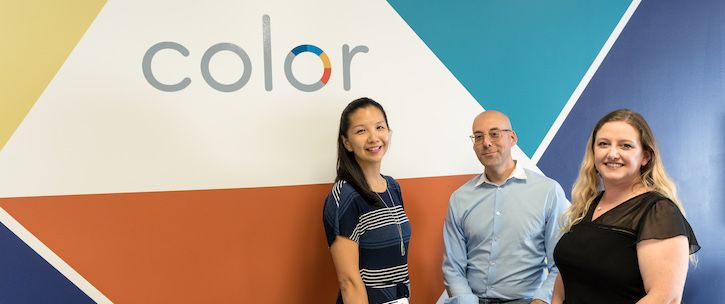Color Talks NIH Deal for 'All of Us' 1 Million Person Genetic Counseling
California-based genomics company talks saving lives, research.

Getting to the bottom of the very DNA within the American melting pot is the subject of a multi-million-dollar new partnership announced today.
Color, a California-based genomics and health tech company, was selected by the National Institutes of Health to perform all the genetic counseling for the All of Us research program.
The All of Us program—described as perhaps one of the “most ambitious research programs in history”—seeks 1 million volunteers from all walks of life and backgrounds in America, and to get to the bottom of each allele in their genomes, starting with those that might prove problematic.
Color’s first year grant is $4.6 million — and is part of a multi-year $25 million project to help Americans understand what’s in their DNA. Color previously received one of the All of Us genome center awards, in collaboration with the Broad Institute and Harvard’s Laboratory of Molecular Medicine, for some of the other All of Us work.
“This is part of the vision we had for Color from the beginning, which is how to incorporate genetic information into healthcare delivery in a responsible way at scale,” said Othman Laraki, CEO and founder of Color. “It’s a great privilege, of course, to be part of that.”
Color leadership spoke with Inside Digital Health™ today, describing a research project which seeks to look within the DNA makeup of as diverse a swath of the United States as has ever been achieved before.
The look starts with 59 medically-actionable genes, as have previously been identified in publications by the American College of Medical Genetics, said Scott Topper, Ph.D., FACMG, and vice president of clinical operations and laboratory director at Color.
“In general, they are a question of genes related to cancer, genes related to cardiovascular conditions that would be very consequential for someone’s health,” said Topper, adding that genes could be added, depending on the future evidence. “Our hope is that what we learn from the All of Us program will be a big part of informing that knowledge base.”
Color is projecting a 3% rate of participants having actionable genetic factors, said Topper—translating to roughly 30,000 counseling cases.
Color has already delivered data to 15,000 previous patients over the last two years and to date, said Alicia Zhou, Ph.D., vice president of research and scientific affairs at Color.
“One of the things that’s really unique about the program is the desire to be returning results to all the participants,” said Zhou. “This is pretty different from the way other large research cohorts have been built.”
All participants—even those balance of the million who don’t have the worrisome genes—will have counseling available to them, added Zhou.
The workflows of how Color handles the counseling remains to be determined with the advice and collaboration of NIH. But for the previous 15,000 cases Color has completed, they have an action plan which may provide a template for the coming 1 million in “All of Us.”
For those with “positive” results—those who have actionable genes which could lead to health impacts—Color moves fast. First, there is an online scheduling tool and contact made, leading to contact in approximately 99 percent of cases within the first 48 hours. Subsequently, a phone consultation walks patients through the results, Zhou said.
For those with “negative” results, the participants have a choice in how to far they dive into the nuances of their DNA, she added.
“We are honored to provide the technological backbone—software and services including our genetic counseling program—to extend the reach of this groundbreaking effort across all 50 states and showcase a scalable model for the integration of genomics into public health,” added Laraki, the Color CEO.
“All of Us” thus far is on track to reach the 1-million threshold, with 230,000 volunteers so far, according to recent public statements.
The NIH emphasized in a statement that “All of Us” is unprecedented in scope and scale.
“A genetic counseling award of this size is a first for NIH,” said Brad Ozenberger, Ph.D., genomics program director of the All of Us Research Program. “We look forward to working with Color and our entire consortium to discover ethical and effective ways to deliver genetic counseling at this very large scale across diverse communities.”
Get the best insights in digital health directly to your inbox.
Related
CMS and ONC Propose New Rules to Improve Interoperability of EHI
CMS, ONC Rules & the Information Technology Foundation of Healthcare Progress